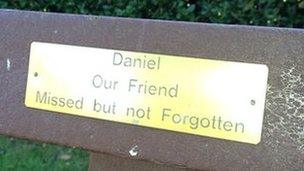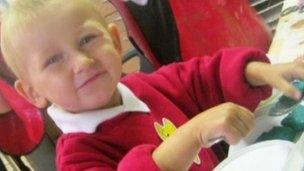Daniel Pelka: 'Missed but not forgotten'
- Published

A bench in memory of Daniel Pelka sits in a corner of his school's garden
At Daniel's former primary school in Coventry there's a permanent memorial.
In a quiet corner of the garden is a bench bearing a plaque which reads: "Daniel. Our friend. Missed but not forgotten".
It's an apt epitaph for a child described as "invisible" in the serious case review.
There were dozens of missed opportunities to intervene in his short but chaotic life, but only one or two key moments where the accumulation of evidence might have triggered action.
A key theme to this and many other high profile serious case reviews is that critical information wasn't adequately shared between professionals.
The 76-page report portrays a system where staff are overworked and the system repeatedly lets individuals, like Daniel, down.
'Solemn' and withdrawn
None of the agencies involved - the police, teachers, doctors, nurses and social workers - ever directly asked him about his extreme weight loss, bruises and other injuries.
The report attempts to explain why.

Daniel died from a head injury in 2012
It says Daniel was a "solemn" and withdrawn little boy who spoke very little English. There was a scarcity of interpreters, and Daniel's mother, Magdalena Luczak, was "controlling" and "intimidating".
Daniel, she said, had a medical condition which accounted for his weight loss. The cuts and bruises were explained away as typical childhood injuries. When he broke a bone, the explanation was believable - he'd fallen off his bike.
The report's author, Ron Lock, has written 11 other serious case reviews. He says child protection professionals were often unprepared to "think the unthinkable" and were often too willing to follow the "rule of optimism".
In this case it meant, despite clear signs to the contrary, no-one was willing to consider that Daniel was being subjected to prolonged and horrific abuse.
There were exceptions. A police officer insisted that the case be referred on after one of many visits to a call about domestic violence.
Teachers at Little Heath Primary School were worried enough to report Daniel's behaviour and involve the family GP and a paediatrician, but the referrals never got beyond that.
Martin Reeves, chief executive of Coventry City Council, points out that there haven't been any other cases like this in the city and believes that may have contributed to the failure to recognise the severity of the case.
He also said more would be done to ensure agencies shared vital information about cases. He promised that lessons had already been learned.
However, there have been other high profile cases nearby like Khyra Ishaq in Birmingham and Ryan Lovell-Hancox in Wolverhampton, and nationally significant ones like that of Baby P.
'Falling through the cracks'
Dame Clare Tickell, chief executive of the charity Action For Children, said: "The same lessons that need to be learnt from cases like Daniel's are coming up time and time again.
"Hundreds of vulnerable children at risk of dying and serious harm are falling through the cracks of a creaking child protection system."
There have been calls for a wide-scale reform of the child protection system.
One model is being employed in a handful of areas across the country. Different agencies sit alongside each other in what are known as Multi Agency Safeguarding Hubs.
The nearest to Coventry is jointly run by Staffordshire and Stoke-on-Trent. There are frequent briefings and conversations about cases and if more than one agency has a concern, intervention will follow. Professionals who were reluctant to share information have become used to working in a more collegiate way.
The next serious case review into a child's death will focus on Keanu Williams, the two-year-old boy beaten to death by his mother Rebecca Shuttleworth in Birmingham in 2011.
It's expected to be published in a matter of weeks. If the same failings are found to have taken place again, the clamour for a wholesale reform of child protection is likely to grow.
- Published17 September 2013
- Published17 September 2013
- Published17 September 2013